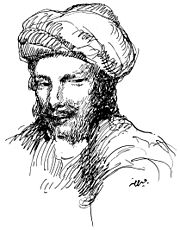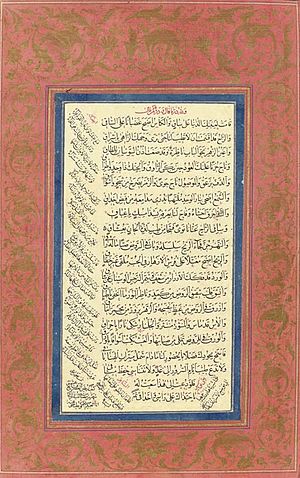Abu Nuwas facts for kids
Quick facts for kids
Abu Nuwas
|
|
|---|---|

Abu Nuwas, as drawn by Khalil Gibran in 1916.
|
|
| Born | 756 |
| Died | 814 (aged 57–58) - Baghdad |
| Occupation | Poet |
Abu Nuwas (full name: Abū Nuwās al-Ḥasan ibn Hānī al-Ḥakamī) was a very famous Arabic poet. He lived a long time ago, from about 756 to 814 AD. He was a leading poet during the early years of the Abbasid Caliphate, a large Islamic empire.
Abu Nuwas is also known from popular stories. He appears several times in the famous collection of tales called One Thousand and One Nights.
Early Life
Abu Nuwas was born in a place called Ahvaz. This area is now part of modern Khuzestan Province. He was born around 756 or 758.
His father, Hani, was from Syria or Persia. He served in the army of a ruler named Marwan II. His mother, Gulban, was Persian. She met Hani while he worked in the police force in Ahvaz. Abu Nuwas was only 10 years old when his father passed away.
When he was a young child, Abu Nuwas moved with his mother to Basra. Basra is a city in lower Iraq. There, he went to a school where he studied the Qur'an. He became a Hafiz at a young age. This means he had memorized the entire Qur'an.
Abu Nuwas had a natural charm and talent. A poet named Waliba ibn al-Hubab noticed him. Waliba took Abu Nuwas to Kufa as a young helper. Waliba saw Abu Nuwas's gift for writing poems. He encouraged him to become a poet.
What He Wrote
Abu Nuwas wrote many different kinds of poems. He was especially good at writing poems about hunting. He also wrote funny poems that made fun of things. This was part of a long tradition in Arabic poetry.
He is also known for helping to create a type of literary puzzle. This puzzle is called a mu‘ammā. You solve it by putting together letters from a word or name. He also made two types of Arabic poetry very popular. These were Khamriyya, which are poems about wine, and Tardiyya, which are poems about hunting.
His Later Years and Death
Abu Nuwas was put in prison during the rule of a leader named Al-Amin. This happened not long before he died. He passed away around 814 AD.
People have different ideas about how he died. Some say he was poisoned. Others say he died from an illness. He was buried in a cemetery in Baghdad called Shunizi.
His Legacy

Abu Nuwas is still remembered today. The city of Baghdad has places named after him. There is a street called Abū Nuwās Street. It runs along the east side of the Tigris River. There is also a park called Abu Nuwas Park.
In 1976, scientists named a crater on the planet Mercury after him. This shows how important he was. In 2007, a group in Algeria was also named after him. It is called the Abu Nawas Association.
See Also
 In Spanish: Abu Nuwas para niños
In Spanish: Abu Nuwas para niños
 | Emma Amos |
 | Edward Mitchell Bannister |
 | Larry D. Alexander |
 | Ernie Barnes |

